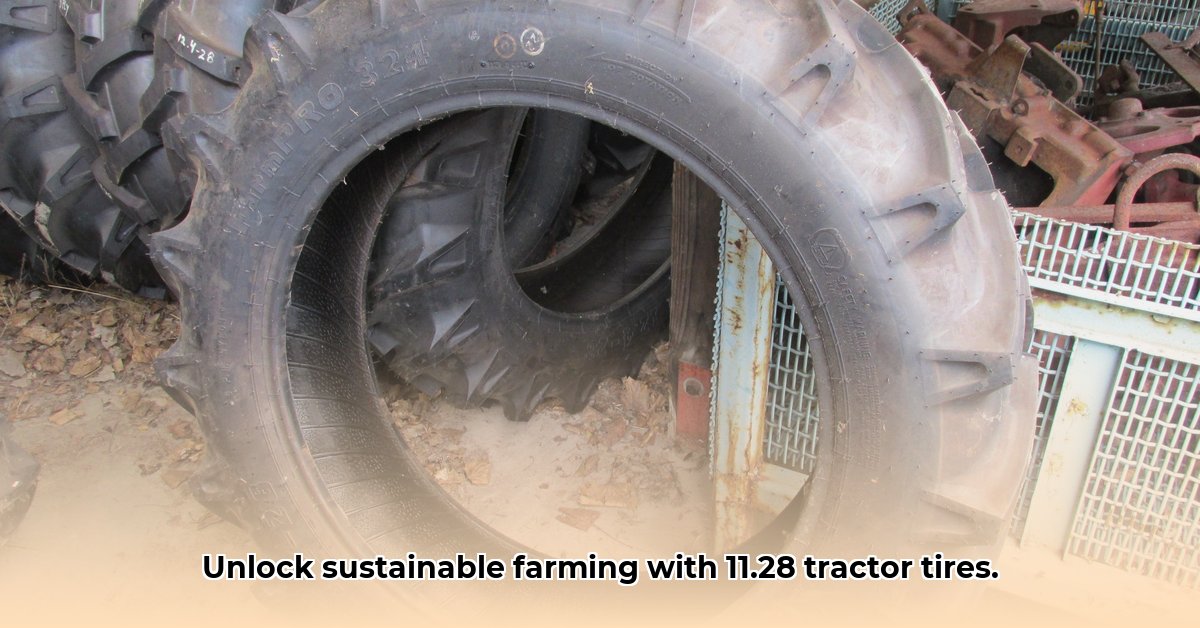
Want to boost your farm's sustainability and profitability? It starts with your tractor tires! This guide focuses on 11.28 tractor tires—a size frequently used in sustainable agriculture—detailing how to select, maintain, and leverage them for optimal environmental and economic benefits. We'll cover everything from tire specifications to their surprising impact on fuel costs and soil health. For more information on compact tractor tires, check out this helpful resource.
Decoding 11.28 Tractor Tires: More Than Just Numbers
The "11.28" designation indicates the tire's width (11 inches) and diameter (28 inches). However, the selection process extends far beyond these dimensions. Consider tire type, tread pattern, and construction—factors heavily influencing soil compaction, fuel efficiency, and traction.
Choosing the Right 11.28 Tractor Tires: A Tailored Approach
Selecting the optimal 11.28 tires requires a nuanced approach.
Soil Type: Sandy soils necessitate tires with aggressive treads for superior traction, while clay soils benefit from gentler treads to minimize compaction. Don't your crops deserve the best possible root environment?
Workload: Heavy hauling demands tires with reinforced sidewalls and durable tread compounds, whereas lighter tasks may prioritize fuel-efficient designs. What’s your typical daily workload?
Budget: While initial costs may vary, low rolling resistance tires significantly reduce long-term fuel expenses. Isn't consistent cost-effectiveness a priority?
Compatibility: Verify tire compatibility with your tractor's specifications before purchasing to ensure optimal performance and safety. Avoid costly mistakes by confirming compatibility.
Tire Type: Radial tires are generally preferred for reduced soil compaction compared to bias-ply tires. This difference, while seemingly small, can significantly affect your yields. What's your soil compaction strategy?
Tread Pattern: Aggressive treads provide superior grip in challenging conditions, while smoother treads improve fuel efficiency on firm ground. What are your typical operating conditions?
Tire Maintenance: Extending the Life of Your Investment
Proper tire maintenance is crucial. It's not just about extending lifespan; it's about minimizing environmental impact and maximizing return on investment.
Inflation: Maintain correct tire pressure according to manufacturer recommendations, using a reliable pressure gauge. Underinflation increases wear and fuel consumption; overinflation risks damage. Are you monitoring inflation regularly?
Regular Inspections: Visually inspect tires for cuts, punctures, or unusual wear patterns, addressing any issues promptly. A quick daily check can prevent costly repairs.
Rotation: Rotate tires to ensure even wear distribution, maximizing lifespan. Do you have a tire rotation schedule?
Storage: Store unused tires in a cool, dry location away from direct sunlight and extreme temperatures. Protection from the elements extends the life of your investment.
Sustainable Farming and 11.28 Tires: A Winning Combination
The appropriate selection of 11.28 tires significantly contributes to sustainable agricultural practices.
Reduced Soil Compaction: Minimized compaction improves water infiltration, soil structure, and reduces erosion. This, in turn, enhances nutrient uptake, leading to higher yields and reduced fertilizer requirements. How does improved soil health impact your bottom line?
Lower Fuel Consumption: Efficient tires lower fuel costs and reduce greenhouse gas emissions. "Every drop counts," as Dr. Emily Carter, Professor of Chemical and Biological Engineering at Princeton University, emphasizes regarding energy efficiency.
Increased Crop Yields: The combined benefits of reduced compaction and improved soil health typically result in increased yields. How will higher yields affect your farm's profitability?
Cost-Benefit Analysis: Investing in Sustainability
While high-quality, low-compaction tires may have a higher upfront cost, long-term savings in fuel, maintenance, and improved yields often surpass the initial expense.
Conclusion
Choosing the right 11.28 tractor tires is a critical step towards sustainable and profitable farming. This investment yields significant returns in improved soil health, reduced costs, and increased crop yields. Continued research will further refine our understanding; however, the current evidence strongly suggests prioritizing low-compaction tires for a more environmentally sound agricultural operation. The future of farming, and our planet, depends on it.